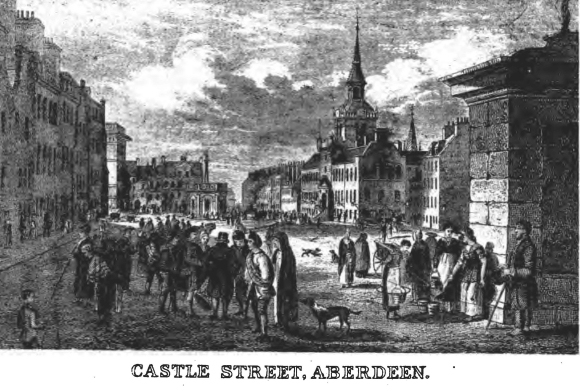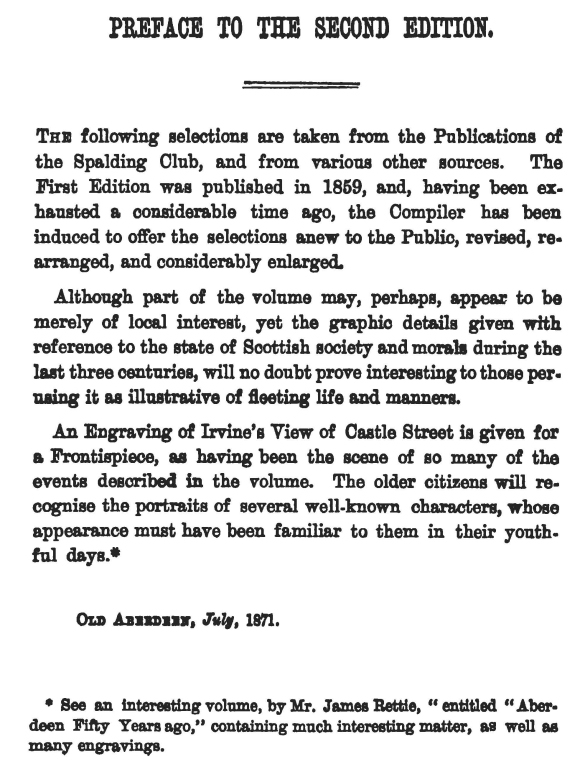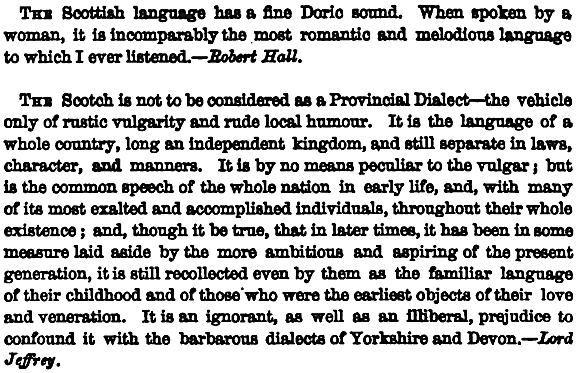|



Here is one of the
stories from this book...
MRS, THOMSON AND FAMILY
Who among us that can
number fifty or sixty summers having gone over their heads, and who have
been born and brought up in Aberdeen, but recollects a small bookseller
and stationer's shop, situated at the top of the then Narrow Wynd (now
forming the line of Union Street), opposite the Pl»instones. This little
shop had nothing of the decorative style in its exterior either to
recommend or attract notice. None of your large windows, either straight
or circular, were though necessary in those days to carry on the
business of this little shop; yet, notwithstanding the unassuming
appearance of the exterior, I will venture to affirm that, among all the
booksellers shops in Aberdeen, there was not one among the number so
universally known to the youngsters there, either high or low, rior of
poor, as was the little shopie aside the Plainstanes. Who, also among
the said class, but recollects the smart, active, cheerful little lady,
who generally was to be found behind the counter in the said shop, as
the acting manager of that department—Miss Christian Thomson. When I
first knew this worthy family— and that was as soon as I could (by
myself) toddle across from the one side of Huxter Bow to the other.
Thomson's family-door being in that street—it consisted of Mrs. Thomson,
her son James, and Misses Christian and Agnes, her daughters. This
little shop should have been designated by some of these or such like
sounding names, which establishments of this sort adopt at the present
day, as “The Royal Juvenile Dept and Library” "The Victoria Emporium for
Children's Cheap Books” &c.; for it was here where every youngster
hurried to procure the favourite work which he long wished to have in
his own possession. The shop had but one window—and that certainly for a
shop was very small—and it was almost always literally covered from head
to foot with the favourite schoolboy authors of the day. Occasionally
the lower panes with these well-known coarse, yet attractive, prints of
their day— such as “The Farm Yard oh Fire," “The Mad Bull," “Haymaking,"
“Harvest Home,” &c. Price Twopence coloured: One Penny plain. Printed
and Sold by Carrington A Bowles, 45, St. Paul's Churchyard.” The prints
of these homely subjects were, I have understood, to be found all over
Europe, and, from the profits arising from their extensive sale, the
children of the firm now live independent.
When these prints were not in the window, their place was occupied by
those esteemed works, "The History of King Pippin,” “The Death of Cock
Robin,” &c; "with cuts and bound in gilt, price one penny” And above
these were the larger volumes of “The History of Lothian Tom,” “Wise
Willie and Witty Eppie,” “The Sayings, and Doings, and Witty Jests of
George Buchanan,” “Sir William Wallace.” And in the poetical department
were to be found “Chevy Chase,” “The Cherry and the Slae,” “Sir James
the Bose,” “The Dominie Deposed,” “Ajax’s Speech to the Grecian Knabs,”
&c.
When we went to the shop to make a purchase (the money being in our
hand), we stepped boldly in. “Weel, my laddie,” said Miss Kirsty, “fat
is’t you want?” “Oh, I want ‘Lothian Tom,' or any other, as the case
might be. “Is it in the window?” was the quiet reply. “O, ay; it’s up
there.” “Just gang out then; chap wi' your finger on the window anent
it, and I’ll tak’ it down to ye.” The ceremony was readily and soon
performed, and the long-wished-for work delivered into our hand by Miss
Kirsty.
It may be easily supposed that it was not every trifling occurrence on
the street that prevented us from hurrying home to run over the contents
of our. newly acquired addition to our library. Miss Christian Thomson
seemed as if nature intended her to have filled this or a similar
situation in life. She was possessed of a strong masculine mind, which
she had improved by much reading. She was allowed, by those gentlemen
who professionally frequented the shop, to be no trifling adversary in a
debate on most general subjects of the day. Miss Kirsty had,
unfortunately, in her younger days received an injury in the spine, and
the usual consequences followed as to her personal appearance; but her
ready wit, her smart repartee, joined to her general information, were
far more than enough to counterbalance her want of personal attractions,
and she passed through life sincerely esteemed and respected by all who
enjoyed the pleasure of her acquaintance.
While the stationery department was thus managed by Mrs Kirsty, that of
the binding was superintended by her brother. The binding shop was but a
small apartment, with one window overlooking the Council Chamber door;
yet, small as this apartment was, I have seen in it, besides Mr. Thomson
and his two apprentices, half a dozen of the neighbours’ children all
stowed away in it, some in one comer, some in another. It was a matter
of surprise to the neighbours how Mrs. Thomson’s family could put up
with the nuisance of so many children running out and in to their house
at their pleasure. There were only two standing orders of the house: the
one—to be sure to shut the door behind you in going out or coming in;
the other—to be sure to dicht your feet weel on the bass. If any of the
children were amissing, the first inquiry after them was made at Mrs.
Thomson’s; and, if any apology was offered for the trouble given by the
children, the reply was always to the same effect—viz.: “Tell Mrs. that
we are aye glad to see the poor things; we would think ourselves out o’
the warld a’thegither if they wema rinnin* out and in as usual.”
It was the binding-shop, however, that was the great centre of
attraction to us children, for Mr. James was a most successful auxiliary
to us in all our little amusements. He could furnish us with paint—red,
black, or yellow—to adorn and beautify the upper surface of our new tap.
He could accommodate us with a piece of twine to tie on our new points
on our fummel-sticks. He would also, on the promise of good behaviour,
oblige us with a superior sort to be a string to our peer (spinning
top); and, if the important affair of a dragon (paper kite) was on the
tapis, his judgment was appealed to, to determine its size and shape,
and, as was anticipated, the necessary material of paper and twine was
also furnished by him. In fact, he seemed to enter into all our little
enjoyments as one of ourselves; and I really think this worthy man felt
little less pleasure in accommodating us than his little friends did in
receiving his favours.
While this worthy family did everything in their power to contribute to
the happiness of their little friends, and to their neighbours
generally, they were also bright examples to those around them, in the
performance of those relative duties which adorn the life of true
Christians. They were ever ready to stretch out their hands to those who
had none to help them; and the poor unfortunate individuals who were
criminally confined in those noxious holes in the Tolbooth, were
occasionally supplied by them with plain but wholesome food; and in
every case of distress which came within their knowledge, their
assistance was always ready.
The Thomson family was famous for possessing a beautiful and
particularly small species of those spaniels generally known as “King
Charles’” breed. They wore remarkable for the inside of the mouth being
black. In my childish days they had two females named Fanny and Sally,
and yelping little curs they were. At an after period, when I went down
to Aberdeen on a visit, I had, along with my mother, the extreme
pleasure of drinking tea with the kind friends of my childish days, the
twa Miss Thomsons, then retired from business. I had, at the same time,
the honour of receiving a puppy from them of the species alluded to,
Miss Kirsty feelingly observing, that “the bit doggie would be a kind of
keepsake and remembrance of Auld Langsyne, when perhaps she and her
sister had baith worn awa!"
You can download this
book here in pdf format |

